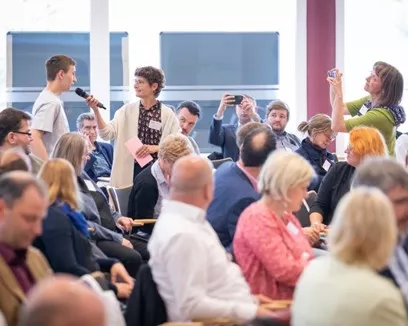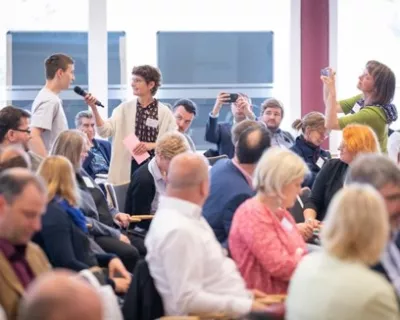Summary
The ‘Brandenburg Village Movement’ aims to tackle the concerns of citizens in small villages, who do not feel sufficiently represented in local, regional and national politics.
Following the example of village movements in other European countries, such as the ‘National Association of Small Towns and Villages’ in the Netherlands (Dutch: ‘Landelijke Vereniging voor Kleine Kernen’), this German village movement built a network of active representatives for remote areas and given them a voice. The movement has proved a success and, after a few years, its voice is even heard in the national parliament.
Results
The village movement has established and expanded several participatory formats that enhance information and the engagement of rural residents in public policy processes, both within their village and with other villages of the region.
The regional village meetings format has led to the development of emerging networks in nearly all regions of Brandenburg. These meetings target active individuals from villages, encouraging them to engage in dialogue with one another and address current challenges in a professionally structured manner. These challenges encompass various topics such as upcoming local elections, renewable energy development and participation rights.
The meetings, typically lasting 2-4 hours, incorporate a methodical blend of information dissemination, working phases and discussion of results with responsible individuals and politicians. A 'Parliament of Villages' is held under the patronage of the president of the state parliament. Its first session in 2022 featured numerous discussions and expert lectures from its members, deepened cooperation with the federal working group of LEADER Local Action Groups and provided professional support for expanding the village movement to the German states of Mecklenburg-Vorpommern and Thuringia.
The village movement is actively working to extend the rights of committees in response to a planned revision of Brandenburg's municipal constitution. People from different villages – delegated by their village networks – state politics and the professional public will meet again at the next 'Parliament of Villages' in Brandenburg in 2024.
Additionally, the village movement participates in various state-wide committees, including the Speaker's Council of the Brandenburg State Network for Civic Engagement and the jury of the state-wide village competition.
Resources
Documents
Context
In Brandenburg, approximately half of the 2.5 million people residing in rural areas live in small towns, with around 2 800 villages where local councils are elected. Recognising the lack of information on how to participate in public debates for many citizens, the village movement aims to empower rural communities, making them more aware of the possibilities for exerting influence and developing the courage and skills to negotiate better political framework conditions. Before 2015, there was no structural support in Germany addressing this issue, even though examples existed in other European countries. One such example is the European Rural Community Alliance (ERCA), a network for national and regional rural and village movements that supports Europe’s rural communities. Through their national and regional rural movements, these communities develop connections, share experiences, engage in mutual learning and take collective action to strengthen their positions.
The movement promotes exchanges between villages and reintroduces them into the realm of politics through dialogue formats like the Parliament of Villages.
Objectives
To establish a village movement in Brandenburg, helping to better integrate the concerns and needs of rural residents at local, regional and state levels. This will enhance citizens’ access to participation, enabling the identification and design of opportunities that can more effectively address current and future challenges in a sustainable manner.
Activities, key actors, and timeline
The Brandenburg Village Movement, established in 2015 by a group of active citizens, including academics and other stakeholders, was inspired by similar movements in Finland and Sweden. Its primary goal is to enhance the engagement and self-efficacy of rural residents, enabling a democratically structured future. Key activities include:
-
Facilitating dialogue: The movement re-engages people within and between villages through open dialogue. This approach fosters transparent opinion formation on crucial matters. Activities include regional village meetings, the initiation and support of regional village networks, two annual village parliaments, and thematic yearly events where experts who want to collaborate are engaged. In practice, this translates to about 10 village meetings held annually in different regions of Brandenburg,, each with around 25-50 participants, as well as approximately 50-70 attendees at thematic events with experts.
-
Providing accessible information and education: Tailored educational content is made readily available to village activists based on their specific needs. This involves collaborating with educational partners to develop custom, decentralised learning opportunities, drawing on the knowledge and experience already present within the villages. The movement maintains regular communication through a monthly newsletter, social media contributions, and participation in at least three advisory boards.
-
Advocating for village interests: The movement represents the interests of Brandenburg's villages, aiming for a multi-perspective understanding of rural areas. This is achieved by issuing statements on current topics through internal working groups, such as those focused on renewable energies, local leaders' rights and digital transformation. The movement also participates in the jury of a support programme in Brandenburg and contributes to the state competition ‘Our Village Should Have a Future’.
Success factors/Lessons learnt
The Brandenburg Village Movement had to develop entirely new structures and coordinate them closely with existing actors to create synergies and bridge gaps in enabling participatory involvement. The goal is to avoid creating parallel structures. In this process, drawing inspiration from other existing movements has been essential. These models have now been tested in Brandenburg and can be adapted and modified by other federal states or regions.Currently, the movement receives funding from the federal state, which covers half a staff position. This funding significantly eases the burden on those who have been volunteering their time. This financial support allows for more extensive political dialogue with grassroots initiatives, aligning politics with local needs and realities. Increased consultation fosters greater trust in politics. Simultaneously, processes like LEADER are reinforced and revitalised.

